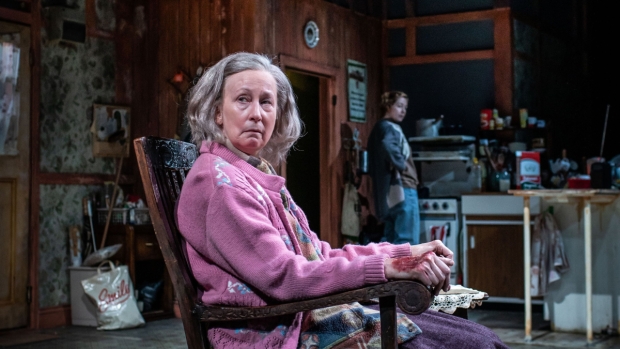The Beauty Queen of Leenane review – Martin McDonagh's early work returns
A co-produced revival between Chichester Festival Theatre and the Lyric Hammersmith opens in the southern town

© Helen Maybanks
Women (but strangely not men) are often told that, to know what they will be like as they grow older, they need look no further than their own mother. Never a truer word said in jest than in Martin McDonagh's Beauty Queen of Leenane, where this theory is taken to its very limits.
Set against a backdrop of a pre-peace agreement Ireland, McDonagh weaves a story of an inter-dependent mother and daughter that loathe each other as much as they rely on one another. That same love/hate relationship between the Irish and the British is referenced throughout and somehow still sadly rings true in the post-Brexit world we currently find ourselves stumbling through.
Leenane is a rugged town in County Galway on the West Coast of Ireland. Its charm and beauty mask its seclusion and isolation. Maureen is 40 and living with her ageing mother Mag, the two of them are trapped in a merry-go-round of chores, complaints and criticism. Maureen's two sisters have left and there is no mention of a father. Mag's daily ritual of Tea and Complan dominate her sickened and ageing life with a total – if not always sincere – reliance on her equally unhappy daughter.
Maureen has suffered with her mental health and has spent time in some form of English mental institution earlier in her life. When love comes her way in the form of Pato – a local man returning from England where he has been working – it is a clear and much needed moment of hope for her to escape – but her mother has other ideas. It is devastatingly selfish, brutally unfeeling and horrifically un-maternal.
Orla Fitzgerald's Maureen is outwardly confident and seems to be able to stand on her own two feet. Yet her repressed anger towards her mother and her sheer frustration with life are always waiting to bubble over at any moment and Fitzgerald keeps her simmering nicely throughout. Ingrid Craigie's Mag is understatedly nasty. She shuffles around making her various demands and aims her barbed tongue at her own daughter with free abandon. There are frailties evident that subtly suggest that Mag's reasons for the control of her daughter are not just born out of sheer malice though.
The relationship between the two is very obviously one of massive dysfunction but the performances by Fitzgerald and Craigie lack real psychological torment as they inflict emotional wound upon emotional wound on one another. As Fitzgerald's Maureen forces her mother to drink lumpy Complan it is less torture and more of gentle persuasion – never fully wince-inducing.
Rachel O'Riordan has directed this revival – a co-production with the Lyric Hammersmith – with a light touch to its very sinister themes. The second act is given more urgency and the tension is certainly ramped up. Following the perfectly framed opening monologue given by Adam Best's excellent Pato, we hurry towards the brutal crescendo that marks the culmination of Maureen and Mag's toxic relationship with audible gasps from many in the audience as they bear witness in the intimate Minerva.
It's all engaging enough stuff but just manages to miss the mark with its levels of toxicity and torment on display. The comedy shines through but the savagery is more difficult to find.












